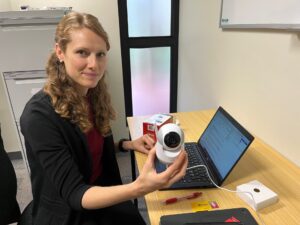
Parents setting bedtime rules can be “protective” of their teenage children’s health and wellbeing, helping them to establish good sleep routines as young adults and in the future, say Flinders University researchers.
Using feedback from 2500 students aged from 12 to 14 between 2019-2020, the national study found adolescents whose parents set bedtimes had at least 20 minutes more sleep on average which can make “all the difference” to next-day performance – including reaching the recommended 8-10 hours of sleep a night.

The adolescent sleep researchers at Flinders University are now seeking 30 participants for a new study in Adelaide to record their self-monitored sleep overnight, using electronic devices and other factors to find out more about teen sleep habits.
“Most young people tend to stay up later and have less sleep when they are left to set their own bedtimes, but qualitative research is finding that adolescents are open to parental guidance to improve their sleep patterns,” says psychology researcher Dr Serena Bauducco, a visiting scholar from Sweden.
“In our national study we also found some adolescents were happy to have parent reintroduce bedtime setting after a period of having no bedtime rules,” adds Ms Bauducco, who says holding on to bedtime rules seems to slow down the natural trend towards later bedtimes and shorter sleep duration seen throughout adolescence.
The study, published in the Journal of Sleep Research, supports a growing body of research supporting the positive impact of parent-set bedtimes on adolescents’ sleep. Teenagers need between 8 and 10 hours of sleep per night.
It not only shows sleep interventions help to maintain positive sleep routines but also can reintroduce bedtimes rules in mid-adolescence, paving the way for sleep gains in teenagers at an age when school-based sleep education and other awareness programs are seeking to improve sleep health.
“We therefore encourage public health recommendations to highlight the beneficial effects of maintaining bedtime rules into adolescence.”
Flinders University sleep researchers are inviting 16-18 year old females, with a friend, to take part in an overnight stay in the Flinders University Sleep and Psychology Lab at Bedford Park. The new study will examine their evening routine and sleep habits with and without mobile phone, television and other factors. Meals and a gift voucher will be offered. Contact email: flinderssleepandeatstudy@outlook.com
The study will look at the use of mobile phones and other technology in the evening, and teenagers’ understanding of the need for the recommended 8-9 hours sleep for cognitive function, physical health and mental wellbeing.
“The idea is to look at teenagers’ bedtimes when parents are not around,” says Dr Bauducco. “They will come to the lab with a friend and have access to a TV both nights and to a smartphone one night.”
The latest article, It’s past your bedtime, but does it matter anymore? How longitudinal changes in bedtime rules relate to adolescents’ sleep (2023) by SV Bauducco, LA Gardner, K Champion, N Newton and M Gradisar, has been published in the Journal of Sleep Research DOI: 10.1111/jsr.13940.
This study used data from the Health4Life study, a large cluster randomised controlled trial evaluating the effectiveness of an eHealth intervention to improve lifestyle risk factors among Australian secondary school students. Participants were Year 7 students from 71 participating schools across New South Wales, Queensland and Western Australia. The analytical sample of the current study consisted of 2509 adolescents with data on parent-set bedtimes at both time points.
Funding: The Health4Life study was funded by the Paul Ramsay Foundation and the Australian National Health and Medical Research Council grants to University of Sydney co-authors.

